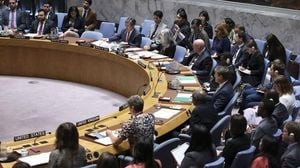The Philippine political scene has been thrown into turmoil after the Supreme Court’s recent ruling nullified the impeachment case against Vice President Sara Duterte—sparking debate about constitutional procedure, separation of powers, and the very nature of accountability for top officials. The Senate’s subsequent decision to archive, rather than dismiss, the impeachment articles has only deepened the controversy, with lawmakers, legal experts, and activists weighing in on the future of this high-profile case.
On August 7, 2025, the Senate voted 19-4 with one abstention to archive the articles of impeachment against Vice President Duterte. This move followed the Supreme Court’s July 25 decision, which declared the impeachment unconstitutional on procedural grounds. According to Inquirer, the Court cited two main reasons: the complaint was barred by the one-year filing period under Article XI, Section 3(5) of the Constitution, and the articles violated Duterte’s right to due process. In effect, the Court found that the fourth impeachment complaint filed within a single year was void from the start.
President Ferdinand “Bongbong” Marcos Jr., speaking from his state visit in India, was quick to clarify the implications of the Supreme Court’s ruling. “We have to make very, very clear to everyone that the Supreme Court decision does not have any bearing on the rightness or wrongness of the merits of the impeachment case. They’re not saying that there was no wrongdoing. Neither are they saying there was wrongdoing. All they’re saying is you did not handle it properly. That’s it,” Marcos told reporters, as reported by ABS-CBN and Inquirer. He stressed that the executive branch, including himself, plays no part in impeachment proceedings: “I’m an impeachable officer. I cannot involve myself in any of this. So, it’s really the Supreme Court, the Senate, and the House.”
The President’s remarks echoed the Supreme Court’s own language, which emphasized that its ruling was strictly procedural. The Court did not examine the merits of the charges leveled against Duterte, which included accusations of culpable violation of the Constitution, betrayal of public trust, and other high crimes. “The merits of the case have not been examined, tried, adjudicated, argued, discussed. So, accountability just doesn’t come into it. People have to understand, it is a procedural question,” Marcos reiterated, according to The Manila Times.
Vice President Duterte herself responded to the Senate’s decision with a call for respect. Speaking after a thanksgiving Mass for the Kadayawan Festival in Davao City, she told the public, “We need to respect the role of the Senate of the Philippines in our country, so if that was the decision of most of the members of the Senate, we need to follow and respect it.” Duterte revealed that her legal team had anticipated the possibility of archiving before the trial even began and said she is prepared to face future impeachment cases, which she expects could be filed against her between 2026 and 2028.
Duterte also commented on her father, former President Rodrigo Duterte, who is currently detained at The Hague on charges of crimes against humanity. She said he was glad to hear about the favorable ruling from the Supreme Court. Meanwhile, Duterte addressed accusations from Malacañang’s spokesman about her travel to Kuwait, dismissing them as “another case of political gaslighting.” She insisted, “It is not true that I went to Kuwait without a travel authority.”
Despite the Supreme Court’s procedural dismissal, the debate over accountability remains fierce. House Public Accounts Committee chairman Terry Ridon emphasized that the impeachment case was never about political personalities but about the rule of law and accountability, particularly regarding the use of confidential funds and threats against officials. “This is about accountability on the use of confidential funds, the accountability in the threats against the President, the first lady and the House Speaker,” Ridon said in a press briefing, as reported by The Manila Times.
The Liberal Party, for its part, stated it is not actively advocating for impeachment over the Supreme Court’s ruling but acknowledged that impeachment remains an option, according to ABS-CBN.
Legal experts and activists have been quick to challenge the Supreme Court’s decision. Three motions for reconsideration (MRs) have been filed, urging the Court to reverse its ruling. These MRs argue that the decision contains factual errors, represents judicial overreach into Congressional prerogatives, and effectively amends the Constitution by imposing procedural obstacles not required by its text. The Bagong Alyansang Makabayan (Bayan), which filed the second of four impeachment complaints, warned that if the ruling stands, it could “make accountability even more remote and difficult to achieve [and] burdens the people’s recourse to a constitutional remedy with technical and procedural obstacles that the Constitution itself does not require.”
The National Union of People’s Lawyers (NUPL), representing several complainants, echoed these concerns. NUPL Secretary-General Josalee Deinla stated, “The framers of the 1987 Constitution intended impeachment to be a politically accessible tool of accountability, not a constitutional remedy encumbered by procedural obstacles. The Supreme Court’s ruling narrows the very pathway that the Constitution deliberately kept open.”
Among legal scholars, opinion is divided about the future of the impeachment case. Retired Supreme Court Justices Adolfo Azcuna and Antonio Carpio have argued that the Senate’s decision to archive, rather than dismiss, the case leaves open the possibility of revival should the Supreme Court reverse itself. “(The move) shelves the case without prejudice to being retrieved before the lapse of the present Congress,” Azcuna noted in a Facebook post. Carpio, meanwhile, said the Court would need to address “the glaring factual errors in its decision, as well as its violation of the doctrine of prospective overruling.”
However, others are less optimistic. Lawyer Domingo Cayosa, former president of the Integrated Bar of the Philippines, cautioned that the Supreme Court’s reasoning—barring the fourth impeachment complaint after the first three were archived—could make it difficult to revive the case. “Even if the Senate says we can revive this when the Supreme Court reverses itself, most probably the respondent (Duterte) will just say, it’s already deemed dismissed and therefore violative of the one impeachment complaint a year rule,” he explained.
University of the Philippines constitutional law professor Paolo Tamase described the impeachment as “basically comatose.” He noted that unless the Supreme Court reverses its decision, “the case is dead.” Tamase added that while the House could refile the complaint, doing so would be a “pretty tall order” under the new procedural guidance.
For now, the fate of the impeachment—and the broader question of accountability for the country’s top officials—remains uncertain. Legal motions are pending, political strategies are being recalibrated, and the public continues to watch closely as the drama unfolds in Manila’s halls of power.





